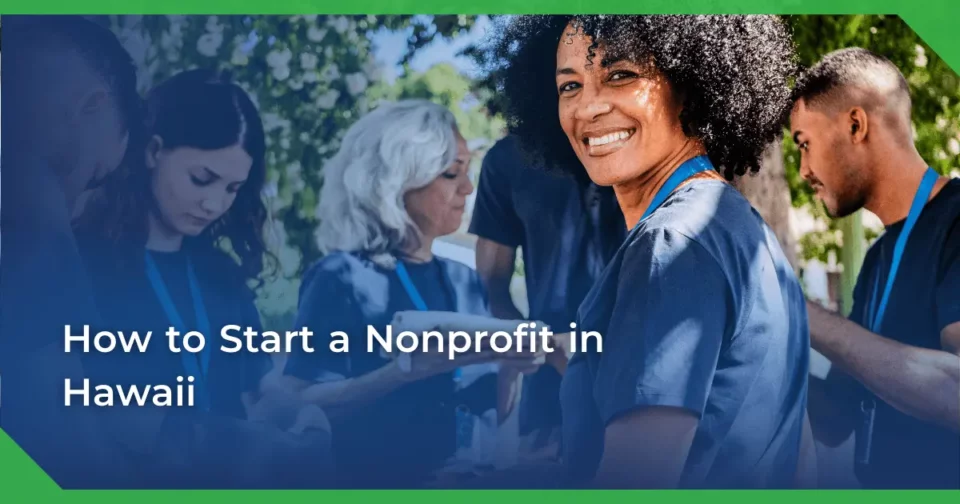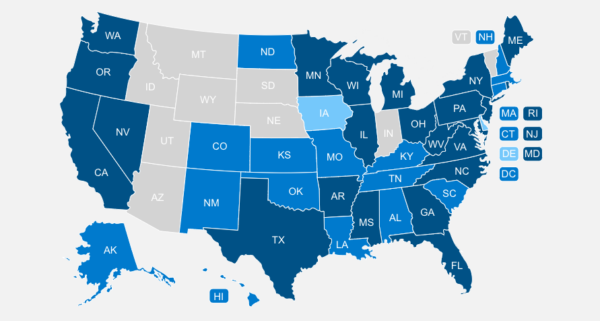
How to Start a Nonprofit in Georgia: Expert Step-by-Step Guide
August 26, 2025
How to Start a Nonprofit in Idaho: Step-by-Step Guide [With Legal Checklist]
August 26, 2025How to Start a Nonprofit in Hawaii: A Simple Step-by-Step Guide (2025)

Whether you dream of protecting Hawaii’s unique environment, preserving its rich culture, or serving its diverse communities, starting a nonprofit in Hawaii could be your path to making a lasting impact. However, navigating the setup process might seem overwhelming at first.
The good news? You don’t have to figure it out alone. Specifically designed for Hawaii’s unique landscape, this comprehensive guide will walk you through every step of establishing your nonprofit – from defining your mission to securing your tax-exempt status. With expert support from organizations like Labyrinth, Inc., the sector’s most trusted compliance partner with over 35 years of experience and a 100% IRS approval guarantee, you can transform your vision into a thriving nonprofit organization with confidence.
Ready to make a difference in the Aloha State? Let’s dive into the essential steps you’ll need to take to start your nonprofit in Hawaii!
Understanding Nonprofits in Hawaii
The nonprofit sector in Hawaii stands as a vital force in shaping the state’s social and economic landscape. With over 7,441 nonprofit organizations registered across the islands, these organizations play a crucial role in addressing community needs and fostering positive change.
Current Nonprofit Landscape in Hawaii
The nonprofit sector in Hawaii employs 56,000 people, representing 11.6% of the state’s workforce. Additionally, these organizations generate more than $6.60 billion in annual revenues and hold assets of nearly $25.43 billion. Furthermore, Hawaii foundations annually distribute over $109 million in grants, while residents contribute more than $625.80 million to charity each year.
The financial health of these organizations varies significantly based on their size. Organizations with less than $1 million in revenue account for merely 4.1% of combined nonprofit revenues. Nonetheless, larger organizations with more than $100 million in annual revenue generate 56.2% of the sector’s earnings.
The sector faces several challenges, particularly in funding and operations. Many nonprofits struggle with delayed payments, which can take three to six months to receive. Moreover, state contracts have remained stagnant for almost a decade, forcing organizations to rely increasingly on fundraising to maintain their services, as outlined in Hawaii Department of Taxation rules.
Types of Nonprofits That Thrive Here
Hawaii’s nonprofit ecosystem encompasses diverse organizations serving various community needs. Here are the prominent categories making significant impacts:
- Health Organizations: Leading the sector with 29,771 employees and $6.49 billion in revenue, health-focused nonprofits form the backbone of Hawaii’s charitable sector.
- Educational Institutions: With 14,231 employees and $1.71 billion in revenue, educational nonprofits significantly influence Hawaii’s learning landscape.
- Human Service Organizations: Employing 10,151 people and generating $707 million in revenue, these organizations address critical community needs.
The Hawaii Community Foundation administers more than $124 million annually in community grants and contracts. For those considering starting a nonprofit, professional guidance from Labyrinth can help navigate the complex landscape with dedicated 1-on-1 support from Nonprofit Compliance Specialists.
Religious organizations, environmental groups, and arts and culture nonprofits also maintain strong presences, collectively employing thousands and generating substantial revenues. Moreover, foundations play a vital role, managing $4.40 billion in assets despite their smaller staff sizes.
The Hawaii Alliance of Nonprofit Organizations (HANO) strengthens these organizations through professional development opportunities and affordable consulting services, according to Hawaii Department of Taxation details. Through collaborative efforts and shared resources, Hawaii’s nonprofits continue adapting to meet evolving community needs while maintaining their commitment to service.
Planning Your Hawaii Nonprofit
You’ve assessed community needs and identified gaps in existing services. Now what? Let’s tackle the strategic planning that transforms your vision into a functioning nonprofit organization.
Defining Your Mission and Purpose
Your mission statement serves as the cornerstone of your nonprofit, guiding every decision and action. An effective mission statement should be concise, realistic, and inspirational. Rather than including specific programs, focus on expressing the human or societal needs your organization aims to address.
When crafting your mission statement:
- Make it brief (15-20 words) and clear
- Use active voice to demonstrate ongoing commitment
- Include emotional elements that resonate with supporters
- Ensure accuracy in reflecting your organization’s activities
Through Labyrinth, Inc., you can receive expert guidance in developing a mission statement that aligns with both federal and state requirements. We ensure your mission statement meets IRS standards while authentically representing your vision, drawing on our team’s 15+ years of nonprofit leadership experience.
Choosing Your Service Area
In selecting your service area, first verify that no existing organizations already serve your intended cause. Consider collaborating with established nonprofits instead of starting anew if similar services exist, as this approach often maximizes community impact and resource utilization.
The Hawaii Community Foundation strengthens communities by:
- Creating partnerships with funders and nonprofits
- Investing in initiatives addressing critical needs
- Supporting local organizations working toward positive change.
Creating a Startup Budget
A comprehensive startup budget ensures your nonprofit’s financial stability. Let’s focus on the core filing costs and timelines you’ll need to plan for:
Core Startup Expenses:
- State incorporation fee: $25 (with optional $25 expedite fee)
- Federal 501(c)(3) application: $275 or $600
- Basic business application (Form BB-1): $20
Processing Timelines:
- Hawaii state incorporation: 5-7 business days (standard), 1-2 days (expedited)
- IRS Form 1023 review: 2-12 months depending on application complexity
- EIN acquisition: Immediate (online), 4 business days (fax), 4-5 weeks (mail)
Professional guidance from Labyrinth can help ensure your applications are complete and accurate from the start. Our transparent pricing model includes all formation services with no hidden fees, and Hawaii nonprofits benefit from our state-specific drop-off service for faster processing of formation documents.
Your business plan should include:
- Executive Summary: Outline your organization’s purpose and community need
- Programs and Services: Detail your planned activities
- Marketing Strategy: Address both donor and beneficiary outreach
- Operational Structure: Define your organizational hierarchy
- Impact Assessment: Explain how you’ll measure success
Remember, successful nonprofits often generate revenue through multiple streams, including:
- Fees for services
- Grant funding
- Public and private donations
Your startup budget should account for both immediate needs and long-term sustainability. Consider allocating funds for professional development and training to strengthen your organization’s capacity, as detailed on the eHawaii portal for nonprofits. Through proper planning and resource allocation, your nonprofit can establish a solid foundation for serving Hawaii’s communities effectively.
Setting Up Your Organization
Establishing a strong organizational foundation requires careful attention to legal requirements and strategic decisions. Let’s explore the essential steps to set up your nonprofit organization in Hawaii.
Selecting Board Members
Your board of directors forms the governing body of your nonprofit, making them crucial stakeholders in your organization’s success. In Hawaii, we recommend having at least three unrelated directors to align with IRS requirements. Through Labyrinth, Inc., you can receive expert guidance on building an effective board, with support from specialists who understand Hawaii’s specific requirements.
When selecting board members, consider these key factors:
- Financial expertise and community connections
- Diverse perspectives in terms of age, gender, and race
- Experience with your nonprofit’s target population
- Strategic thinking and governance skills
Board members serve terms of up to five years, with a default term of one year. Subsequently, your board must maintain:
- A minimum of two directors for committee formation
- A majority presence for quorum requirements
- One officer to prepare meeting minutes and authenticate records
Filing Articles of Incorporation
Filing your articles of incorporation with the state officially establishes your nonprofit in Hawaii. First, you’ll need to include specific IRS-required language in your articles to qualify for 501(c)(3) status later. This includes an IRS-approved purpose clause limiting activities to exempt purposes and a dissolution clause ensuring assets transfer to another 501(c)(3) upon dissolution.
The Department of Commerce and Consumer Affairs (DCCA) (808-586-2727, cca.hawaii.gov) processes these filings through various methods:
- Online submission
- Fax, as indicated in Hawaii DCCA business registration details.
The filing process requires:
- A $25.00 base filing fee
- Optional $25.00 expedited service fee
- $10.00 for certified copies (plus $0.25 per page)
- Additional $1.00 State Archives fee, according to Hawaii DCCA business registration details.
Your articles must include:
- Corporation name
- Primary business location
- Registered agent information
- Incorporator details
- Membership structure declaration
We streamline this process by preparing all necessary documents and offering Hawaii’s unique drop-off service at state offices, ensuring faster approval times—particularly valuable when time-sensitive grant opportunities arise.
Getting Your EIN
An Employer Identification Number (EIN) functions as your nonprofit’s social security number. You must obtain your EIN after filing your articles of incorporation but before opening bank accounts or applying for tax-exempt status. Through our comprehensive formation services, EIN acquisition is included, eliminating one more administrative burden from your plate.
The Internal Revenue Service (IRS) offers multiple application methods:
- Online (fastest option)
- Phone
- Fax (4 business days)
- Mail (4-5 weeks)
Important considerations for EIN application:
- Apply only after legal formation
- Maintain one EIN throughout your organization’s lifetime
- Use it for employment tax returns
- Required for bank accounts and vendor relationships, per IRS guidelines on EINs for tax-exempt organizations.
For international applicants without a Social Security Number:
- Online applications are not accepted
- Form SS-4 must be faxed
- Leave the SSN field blank or mark as ‘foreign’
- Follow up with the IRS by phone
Remember, your EIN serves multiple purposes:
- Opening bank accounts
- Applying for tax-exempt status
- Submitting annual returns
- Managing employee-related tax matters
With our secure, SOC 2 Type II certified client portal, you can track the status of your EIN application and store all formation documents safely in one place.
Obtaining Tax-Exempt Status
Securing tax-exempt status marks a crucial milestone in establishing your nonprofit organization. Remember, forming your nonprofit corporation does not automatically grant tax exemption—you must apply separately to the IRS for federal recognition, then address state requirements.
Federal 501(c)(3) Application Process
The Internal Revenue Service (IRS) recognizes various types of tax-exempt organizations under section 501(c). Among these, 501(c)(3) status offers the most favorable tax treatment, making donations tax-deductible for donors, as detailed by the IRS. Through Labyrinth, Inc., you can navigate this complex application process with confidence, backed by our 100% IRS approval guarantee.
To qualify for 501(c)(3) status, your organization must operate exclusively for:
- Religious purposes
- Educational advancement
- Scientific research
- Literary development
- Testing for public safety
- Prevention of cruelty to children or animals
The application process involves submitting Form 1023, which requires:
- A comprehensive 29-page application
- Additional schedules based on your activities
- Supporting documentation ranging from 50-100 pages
- Filing fee of $275 or $600, depending on your projected revenue
We handle the entire Form 1023 preparation process, including drafting all required schedules and compiling supporting documentation. Our experts respond to any IRS correspondence during the review process, ensuring your application moves smoothly through approval.
Certain organizations may bypass the Form 1023 requirement, primarily:
- Churches and religious institutions
- Organizations with annual gross receipts under $5,000, according to IRS Form 1023 instructions.
Nevertheless, filing Form 1023 remains beneficial as it:
- Confirms your tax-exempt status officially
- Clarifies your annual reporting obligations
- Verifies tax deductibility of contributions, as per IRS Form 1023 instructions.
We also support Form 1023-EZ filings for eligible organizations and Form 1024 for 501(c)(4) social welfare organizations, providing the same comprehensive service and guarantee across all application types.
Hawaii State Tax Exemptions
Once you secure federal tax-exempt status, Hawaii automatically recognizes your income tax exemption. Therefore, no separate state income tax application is necessary, according to Hawaii Department of Taxation information on tax exemptions. In fact, organizations not required to file Form 1023 with the IRS automatically receive Hawaii income tax exemption, as clarified by the Hawaii Department of Taxation.
For General Excise Tax (GET) exemption, you must:
- File Form G-6 with the Department of Taxation (808-587-4242, tax.hawaii.gov)
- Pay a one-time $20 registration fee
- Submit within three months of starting operations, according to Hawaii Department of Taxation rules.
Through our comprehensive formation services, you receive timely guidance on GET registration to ensure you meet the critical three-month deadline:
- Timing Impact:
- Applications filed within three months: Exemption applies from business start
- Late applications: Exemption starts from filing date, as outlined in Hawaii Department of Taxation rules.
- Income Categories:
- Dues, donations, and gifts: Not subject to GET
- Fundraising activities: Subject to GET even if supporting exempt purposes, per Hawaii Department of Taxation information.
- Operational Aspects:
- Regular filing requirements apply even with exemption
- Rental income generally remains subject to GET
- Interest from bank accounts falls under GET jurisdiction, as detailed by the Hawaii Department of Taxation.
Remember, GET exemption differs from federal unrelated business income tax (UBIT). While federal law exempts fundraising income from UBIT, Hawaii considers it taxable under GET. Currently, legislation aims to align state GET treatment with federal UBIT guidelines to simplify nonprofit operations.
We stay current on evolving tax regulations, ensuring your organization remains compliant as laws change.
Meeting Hawaii State Requirements
Once your nonprofit organization is established, understanding and meeting Hawaii’s state requirements ensures smooth operations. Through Labyrinth, Inc., you can streamline these compliance processes effectively, with ongoing support from experienced Nonprofit Compliance Specialists who understand Hawaii’s unique regulatory environment.
Registering for Charitable Solicitation
Unless exempt, your nonprofit must register with the Hawaii Attorney General (808-586-1500, ag.hawaii.gov) prior to soliciting any contributions. Organizations qualify for exemption under certain conditions:
- Annual contributions below $25,000 without professional fundraiser involvement
- Religious organizations exempt from IRS Form 990
- Parent-teacher associations
- Licensed educational institutions
- Nonprofit hospitals, as per the Hawaii Attorney General’s FAQs on Charities Registration.
For non-exempt organizations, the registration process involves:
- Completing an online Unified Registration Statement
- Submitting formation documents and bylaws
- Providing IRS determination letter
- No initial registration fee
Our bundled services include first-year fundraising registration support, ensuring you meet all requirements for charitable solicitation from day one.
Required Permits and Licenses
Beyond charitable registration, your nonprofit needs appropriate permits based on activities. The Department of Commerce and Consumer Affairs (DCCA) oversees business registrations, requiring:
- Form BB-1 for basic business registration
- Specific activity-related permits
- Annual renewal of applicable licenses
Through our comprehensive formation package, you can identify and obtain necessary permits promptly. We manage the paperwork while you focus on your mission.
Annual Reporting Guidelines
Annual reporting maintains your nonprofit’s good standing. The reporting schedule follows these parameters:
Financial Report Requirements:
- Due within 10 business days of IRS Form 990 filing
- Must include PDF copy of filed IRS forms
- Audited financial statements required for specific revenue thresholds, as noted in the Hawaii Charity Annual Report Guide.
Annual Fees Structure:
- Less than $25,000: No fee
- $25,000 – $49,999: $25
- $50,000 – $99,999: $50
- $100,000 – $249,999: $100
- $250,000 – $499,999: $150
- $500,000 – $999,999: $200
- $1 million – $1.99 million: $250
- $2 million – $4.99 million: $350
- $5 million and above: $600, according to the Hawaii Attorney General’s FAQs on Charities Registration.
Important Compliance Notes:
- Late fees of $20 per day apply, capped at $1,000
- Payment reminders sent via email after report acceptance
- Organizations must maintain current contact information
- Amendments require technical support assistance, as outlined in the Hawaii Charity Annual Report Guide.
The Hawaii Attorney General’s office provides an online portal for:
- Submitting annual reports
- Processing fee payments
- Updating organizational information
- Accessing reporting guidelines, available through the Hawaii Attorney General’s online charity portal.
For organizations filing Form 990-N, special transmittal procedures apply. The system automatically notifies registered agents about upcoming deadlines and acceptance of submitted reports, as described in the Hawaii Charity Annual Report Guide.
Through our secure client portal, you can track all compliance deadlines and store required documentation, ensuring you never miss a critical filing date. We also provide annual report filing services to maintain your organization’s good standing year after year.
Conclusion
Starting a nonprofit in Hawaii requires careful planning, proper documentation, and strict adherence to state regulations. Most importantly, understanding each requirement helps ensure your organization’s success from day one.
Your journey begins with defining a clear mission and selecting dedicated board members. Therefore, securing your tax-exempt status, registering for charitable solicitation, and maintaining annual compliance become manageable tasks when approached systematically. Through Labyrinth, Inc., you can access expert guidance from Nonprofit Compliance Specialists with 15+ years of experience, backed by a 100% IRS approval guarantee that gives you confidence throughout the process.
Above all, remember that Hawaii’s nonprofit sector thrives on community support and professional collaboration. Our fully managed formation services prove invaluable as you establish your organization’s presence, handling everything from state incorporation through federal tax exemption approval while you focus on making a lasting impact in the Aloha State.
The path to creating a successful nonprofit might seem complex, but with proper guidance and dedication, you can build an organization that serves Hawaii’s communities effectively. Start your nonprofit journey today with confidence—our transparent pricing, secure client portal, and end-to-end support ensure you’ll join the thousands of organizations already making a difference across the Hawaiian Islands.


![Your 501(c)(3) Approval Guaranteed{{ include_custom_fonts({"Museo Sans":["Bold","Bold Italic","Regular","Regular Italic"]}) }}](https://no-cache.hubspot.com/cta/default/560178/interactive-194101957210.png)
![Start Your Nonprofit with Confidence{{ include_custom_fonts({"Museo Sans":["Bold","Bold Italic","Regular","Regular Italic"]}) }}](https://no-cache.hubspot.com/cta/default/560178/interactive-194101957151.png)








